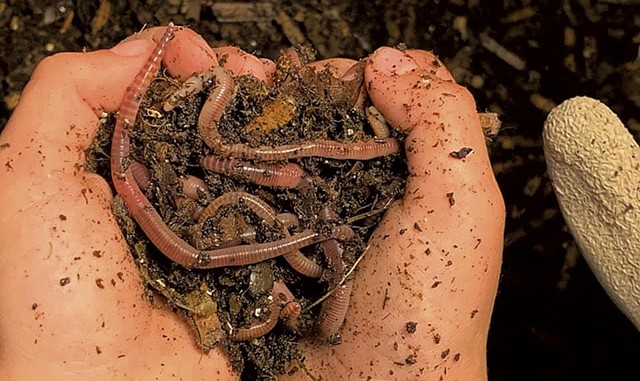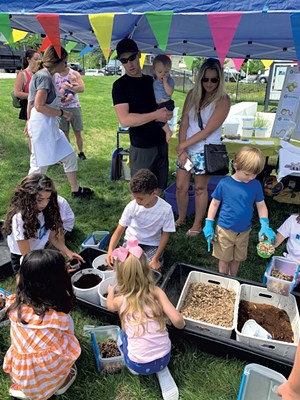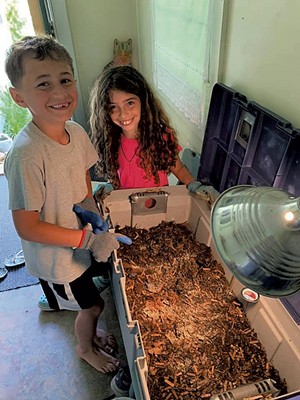Published August 24, 2021 at 10:00 a.m.
Some grandmas do arts and crafts or bake cookies with their grandkids. Kim Ray of Londonderry raises worms. For several years, Ray has been learning about the little wigglers alongside her 9-year-old granddaughter, Lyric, and 6-year-old grandson, Luca. She chronicles their adventures on a website, littlediggerswormfarm.com. A few months ago, Lyric and Luca started hosting informal workshops to teach other kids how to make their own worm farms.
Ray, who has a background in art education, said she and her grandchildren first became interested in worms in 2019. Lyric and Luca, who live in East Dorset, were visiting her house and got excited when they found a few worms in the backyard. They ran around looking for more, and Ray helped them do online research to learn about the creatures.
"I always follow their lead on whatever they want to do," Ray said. "Whatever their curiosity is, I try to nurture that."
It wasn't until an outdoor visit in February, following a period of separation because of the pandemic, that the trio took the fascination to the next level.
"I was thinking, Gosh, you know what we should do? We should start a worm farm, a real one," Ray remembered. "I thought it would be such a fun learning thing for the kids — a total diversion into something that was not pandemic-related or wearing a mask, just something back-to-nature and fun for them."
In June, Lyric and Luca ran a workshop in Danby Village, selling kits that included all the materials for kids to make their own mini worm farms, plus 10 pet worms. In August, they held several additional events — at the Vermont State Fair in Rutland and in the town of Londonderry.
"[We're] teaching little kids respect for nature and how to care for things and hold them gently, rather than saying, 'Here's this yucky worm,'" said Ray.
She and her grandkids' most recent project is making batches of vermicompost — worm castings, or poop, that contain nutrients and soil-friendly bacteria. Gardeners refer to it as "black gold."
Worms, said Ray, are "the ultimate recyclers."
Read on to learn how to make your own worm farm, with directions courtesy of Kim Ray. Contact Ray at hello@ littlediggerswormfarm.com for more information about mini worm farm and vermicomposting kits. Find Little Diggers on Facebook.
Make a Mini Worm Farm
Setting up your worm bin
- Fill a plastic tub (approximately 10-by-6-by-6 inches) halfway with bedding composed of one-third cocoa coir (hairy fiber from the outer husk of a coconut) and two-thirds shredded cardboard, plus small amounts of ground eggshells, sand, shredded leaves and coffee grounds. The tub should have a lid with air holes.
- Spray bedding with water until moist but not too wet.
- Place up to 10 worms on top of the bedding. They'll immediately start to dig down to the bottom.
Feeding your worms
- Dig a small trench in the bedding at one end of the bin and sprinkle approximately half a teaspoon of worm food in it. For food, Ray recommends mixing Layer Mash chicken feed with bits of vegetable food scraps.
- Cover the trench with bedding material. Replenish the food weekly or when the worms have eaten it. Place the food in a different area of the bin each time.
Keeping your worms happy
- Put them in a spot that's not too hot or too cold. Worms like a temperature between 59 to 77 degrees Fahrenheit.
- Check the bedding's moisture regularly. If it gets too wet or too dry, the worms may die. A wet bin will likely get stinky.
- Create a dark environment by covering the bin with its lid when you're not looking at or tending to your worms.
More By This Author
Speaking of...
-

'Jumping Worm' Ruins a Burlington Garden Club's Plans for a Plant Sale
Sep 13, 2023 -

Mr. Fix-It: Marty Spaulding Works Behind the Scenes to Help Students Learn on Campus
Aug 24, 2021 -

Back to School During Delta: A Pediatrician With Young Children Offers a Road Map — and Survival Strategies
Aug 24, 2021 -

Can You Dig It? Make Your Own Worm Farm With These Simple Steps
Aug 24, 2021 -

How to Savor Vermont's Shortest, Sweetest Season
Jun 29, 2021 - More »
Comments
Comments are closed.
From 2014-2020, Seven Days allowed readers to comment on all stories posted on our website. While we've appreciated the suggestions and insights, right now Seven Days is prioritizing our core mission — producing high-quality, responsible local journalism — over moderating online debates between readers.
To criticize, correct or praise our reporting, please send us a letter to the editor or send us a tip. We’ll check it out and report the results.
Online comments may return when we have better tech tools for managing them. Thanks for reading.


















































